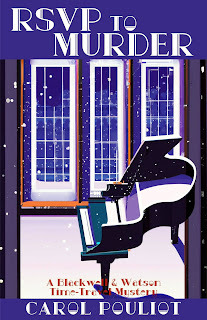Martin Edwards's Blog, page 32
December 24, 2023
Merry Christmas!
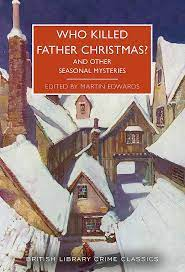
A very merry Christmas to all readers of this blog. Your continuing support is truly motivating - nearly 60,000 page views already this month, which I suspect may be the highest figure ever. Given that the blog has been running for more than sixteen years, this is hugely gratifying. No blog post tomorrow, but I'll be back on Boxing Day, provided I survive the festive excesses!
Have a lovely time and thanks for all your comments and messages during the year - greatly appreciated.
December 22, 2023
Forgotten Book - Dramatic Murder
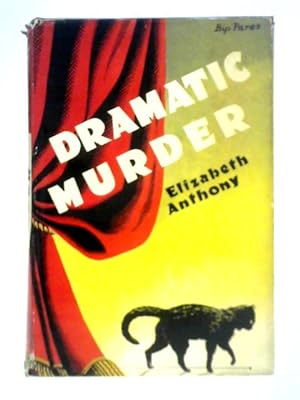
Dramatic Murder is a pretty obscure book that was published by Hodder in 1948. The author was Elizabeth Anthony, but that was a pseudonym for Barbara Rubien. She'd previously published one novel that wasn't a mystery and a couple of years later Hodder published her Made for Murder. But there - apart from one short story published in Ellery Queen's Mystery Magazine in 1957 - is where her crime writing career ended.
This is a pity, because she could write well. Dramatic Murder is a lively story, with a generous helping of four murders and a low-key Scotland Yard detective with the suitably nondescript name of Smith. The first victim is a well-known playwright, known rather oddly as Dimpsie, and this explains (in part) the title of the book. He is electrocuted by the lights on a Christmas tree, so this is in one sense a Christmas mystery, although most of the action occurs after Christmas.
There is an interesting and well-assorted group of suspects, including a big-game hunter, the dead man's secretary, and an actress. Suspicion is juggled quite nicely between them, although in some respects this isn't entirely a 'fair play' puzzle. But it kept me entertained all the way to a fittingly dramatic finale in a theatre.
I don't know why such a capable writer didn't produce more books. My guess is - like so many others before and since - she lost heart when a significant level of commercial success proved elusive. I wonder, also, whether she felt overshadowed by her younger sister's achievements in the genre. For Elizabeth Anthony was born Barbara Courlander and her sister, Nancy Courlander, is better known to crime fans as Shelley Smith, of whom I've often written on this blog.
December 20, 2023
End Game - a Christmas mystery

Back in the 1990s, I wrote a Christmas story, a short story featuring my first series detective Harry Devlin. Fast forward to this year, and I was approached by Otto Penzler, owner of the legendary Mysterious Bookshop and head of the Mysterious Press, to write another. For thirty years, Otto has been commissioning writers to produce a Christmas story which he then presents as a free gift to customers of the shop in the run-up to Christmas.
As I mentioned on Monday, in the context of School of Hard Knox, I'm always very grateful for such invitations. The roll-call of authors who have written in this particular Christmas series is quite something: names like Donald E. Westlake, Ed McBain, Andrew Klavan, Mary Higgins Clark, Laura Lippman, and Jeffrey Deaver. Otto's only requirements are that the story should be set at the festive season and that the shop should be mentioned in some way.
Happily, an idea soon came to me. The result was End Game, and in many ways, it's a quintessentially British story, despite the reference to New York. There are various ingredients - Christmas, a ghost story by the fireside, and something to do with crime - and I enjoyed writing it. Just as important, Otto was happy with the result.
And just the other day I received the happy news that Otto is planning an anthology of these Christmas stories, which will include End Game. Another cause for festive celebration!
December 18, 2023
School of Hard Knox

School of Hard Knox is a just-published anthology of new short stories 'that break Father Ronald Knox's Ten Commandments for Crime Fiction'. The book is edited by a formidable trio of American crime writers, namely Donna Andrews, Greg Herren, and Art Taylor, and is published by that redoubtable imprint Crippen & Landru. I am one of the contributors, so I don't think it's appropriate for me to try to review the book, but naturally I'm very keen to talk about it! For those who would like a more objective view than I can offer, I suggest Jim Noy's review on The Invisible Event.
I was first approached with a view to contributing to the book more than a year ago. I'm always grateful when editors think of me as a prospective contributor to an anthology, not simply because it's good for morale, but mainly because the theme of the proposed book gives me a chance to stretch my imagination in a fresh direction, and that's always good. Unfortunately, it's not always possible, because of other commitments, to say yes to an approach of this kind. For instance, I've just regretfully turned down another approach from a couple of pleasant editors I've worked happily with in the past, simply because I'm too busy at present and the deadline wasn't manageable. A shame. But I felt that if I could come up with a strong enough idea related to Ronald Knox's 'rules', I'd like to have a go.
Having the right idea at the right time is crucial. When I was approached, at around the same time, to write a story for a Beatles-inspired anthology, I thought almost immediately of a story idea inspired by the song 'She's Leaving Home' - and that will be the subject of a future blog post. For the Knox book, an appropriate idea came to me quite quickly and that meant the project was feasible. After quite a lot of work, the idea morphed into a story called 'The Intruder'. Although it's entirely fictional, the setting is inspired by the immediate surroundings of my house in Lymm, and that made the writing especially enjoyable. No need to go travelling to do the research!
My fellow contributors include the three editors, Frankie Bailey (whom I had the pleasure of meeting for the first time recently, when we were both waiting for a bus in San Diego!), Marcia Talley, Dan Stashower, and Toni Kelner. And there's a wonderful bonus at the end - a very enjoyable poem by Peter Lovesey, 'Knox Vomica', which is characteristically witty and clever. A very interesting project to be part of, and I'm grateful to the editors and publishers for thinking of me and giving me the chance to contribute.
December 15, 2023
Forgotten Book - Wake in Fright
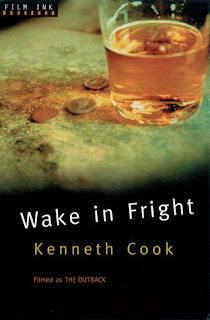
I've had a copy of Kenneth Cook's Wake in Fright lurking on my shelves for a long time - upwards of fifteen years, I shudder to admit, even thought it boasts an intro by Peter Temple. And it's only recently that I got round to reading it. Now I'm wondering why on earth it took me so long. This is a debut novel of high calibre, chilling and memorable.
John Grant is a school teacher who is, for financial reasons, tied to working at a remote school in a small village in the outback. As term comes to an end, he is desperate to get back to Sydney, where an attractive but distant girl called Robyn may or may not be pleased to see him again. He has just enough money to make a success of the trip.
The story has a low-key beginning, and Grant gets off the train at Bundanyabba (based on Broken Hill, a town which Cook clearly disliked) and is befriended by a local cop who is a bit of a slob. They drink together and the cop takes Grant to a gambling den. At first, Grant enjoys a winning streak. But it doesn't last...
Events become increasingly nightmarish as Grant - whose attitude towards the remote towns of the far west of Australia, and the people who live in them is condescending and negative - finds himself mixed up with a strange bunch of locals who are welcoming, but whose way of life is quite terrifying. I don't want to say more about the story than that. Anthony Boucher, who admired the book, questioned whether it is really a crime novel. Certainly, though, it has elements of suspense and menace - and yes, crimes are committed, although they are not necessarily of the kind you'd expect. Cook was obviously an interesting character, who had a rollercoaster life and career. This book and his second, Chain of Darkness, made it into the green Penguin series and I'm keen to read the latter. Wake in Fright was, incidentally, filmed in 1971, ten years after the novel was published.
December 13, 2023
Perfect Friday - 1970 film review
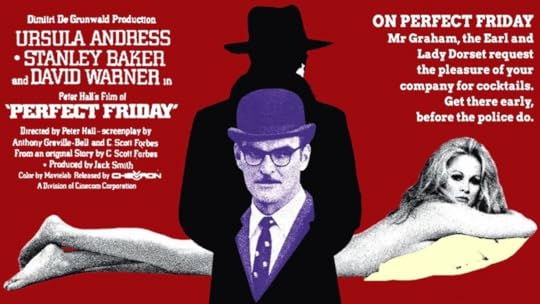
Perfect Friday is a fairly obscure film released in 1970 and directed by Peter Hall, better known for his work in the theatre. The cast is impressive and is led by Ursula Andress, Stanley Baker, and David Warner, with T.P. Mckenna, Garfield Morgan, and Julian Orchard also in attendance. The writers, less renowned, were Anthony Greville-Bell and Scott Forbes, and they came up with a screenplay that is uneven to say the least. But the result is very watchable.
This is a bank heist film which teeters between comedy and drama, with some tense moments as well as one or two unexpected developments. Baker is an assistant manager at a bank, highly respectable but bored. We learn nothing much about his background and life, but when he meets Andress, his fate is sealed. He falls for her and they have an affair. He also wants to conspire with her to rob a bank. She is, however, married, to Warner, and they rope the husband into their little plot. But it's a scenario ripe for betrayal and I could see the final, by no means original, twist coming a mile off.
Before we got to that point, however, there was some enjoyable entertainment. Baker's plan involves taking advantage of the absence from the office of the senior manager to con McKenna's character (Baker's immediate superior) into believing that Warner is actually an envoy from head office, sent over to inspect the money in the bank vault. This part of the story is ingenious and well presented.
The lack of depth in the characterisation, coupled with Warner's innate eccentricity, mean that it's hard to take the key players seriously, even though Baker - as usual - delivers a strong performance. The score is by John Dankworth, but although he was a notable film composer, I found his jaunty themes intrusive. I suspect Hall wasn't quite sure what sort of film he was going to make, while the writers also seem to have been uncertain in their approach. So Perfect Friday is not a complete success, but the ingredients are genuinely interesting.
December 11, 2023
Cambridge Spies - 2003 TV series review
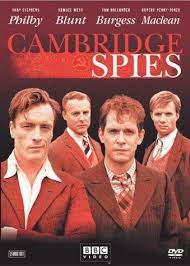
I missed Cambridge Spies when it was first shown on BBC2 twenty years ago, but having heard good things about it, I acquired the DVD and I've belatedly got around to watching it. I'm glad I did, because it's an entertaining account of a fascinating part of our history. When the series was first broadcast, several commentators made the point that historical accuracy is sometimes sacrificed. That's true, but of course in the murky world of spying, figuring out the precise truth is very difficult.
There's a distinct touch of glamour about the series, deriving in part from the Cambridge setting of key early scenes. This is the story of Kim Philby, Donald McLean, Guy Burgess, and Anthony Blunt, who were contemporaries at Cambridge and betrayed Britain because of a blind devotion to Russia. The casting is interesting. Toby Stephens, Rupert Penry-Jones, Tom Hollander, and Samuel West are all fine actors. What's more, they come from pretty privileged backgrounds - as does Benedict Cumberbatch, who has a smaller part - and I think their understanding of the world the spies inhabited gives their performances added zip.
Imelda Staunton, Anna Louise-Plowman, Anthony Andrews, and Ronald Pickup are among the other members of a high-calibre cast, while Peter Moffat's script copes pretty well with the extended timeline of events. Where the script doesn't work quite so well is in its failure to probe the inherent flaws of blind idealism, which are hinted at but not developed quite as effectively as they might have been.
Because of some of the blurring of historical fact, Cambridge Spies is emphatically an entertainment rather than a documentary. But it's nicely done and remains well worth watching because of the quality of the actors and the high production values.
December 8, 2023
Forgotten Book - The Manuscript Murder

In the course of his regrettably short career, Lewis Robinson, who also wrote as George Limnelius, displayed considerable flair as a mystery writer, making excellent use of his inside knowledge of military life. His best-known book is The Medbury Fort Murder, a locked room mystery of distinction that Bob Adey (who introduced me to his work) greatly admired.
I acquired from Bob's estate Robinson's personal copy of The Manuscript Murder, published under his own name in 1933. He made a few handwritten notes on the text and also pasted on to the endpapers various reviews of the book. These included in particular a very positive notice in the Sunday Times from Dorothy L. Sayers, which must have given him enormous pleasure. My copy doesn't have a jacket and the above image comes from an excellent blog, The Grandest Game in the World
The Manuscript Murder is, as the title suggests, a 'bibliomystery', of an unusual and intriguing sort. An unconventional structural device is used in a very interesting way. A rich but disliked man dies and there is a very small pool of suspects. One of them, who is Jewish, is a detective novelist. He actually writes a story about the events leading up to the murder. But is he trying to pull the wool over the police's eyes? And what happens when another suspect then puts pen to paper?
I think this is a terrific concept and the story is well-written. The way in which the Jewish character is described would not be acceptable in a modern writer, but Robinson presents him fairly sympathetically and makes use of the antisemitic 'banter' (a loaded term) that the man suffers from his army colleagues as an element in the plot. On the whole, though, I didn't feel that the quality of the mystery quite lived up to my expectations, which were admittedly high. More could be done with this ingenious concept, I feel. But it's a laudably ambitious novel and I'm not surprised that Sayers was impressed.
December 7, 2023
Gallows Court and an honour in Japan
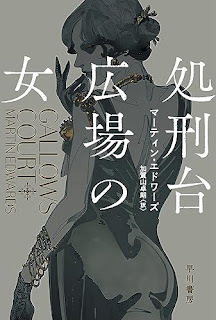
I was thrilled to hear from my old friend Sachiko Tytler the other day. She brought news that the Japanese translation of Gallows Court has been voted Best New Comer (i.e. best crime novel to be translated into Japanese) by a group of 51 critics and other experts engaged by Hayakawa Mystery Magazine.
The book also finished sixth overall in the list of the top ten translated crime novels, which is quite something. I've been delighted by the response to my writing in Japan and other parts of east Asia in recent times - an exciting and unexpected bonus to the writing life.
Great credit, of course, goes to my translator, Mr Kagayama. I'm really grateful for his enthusiasm for the Rachel Savernake novels. The next book in the series to be published in Japan will be Mortmain Hall.
December 6, 2023
Carol Pouliot on Country House Mysteries - guest blog
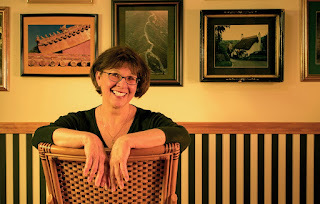
At Malice Domestic earlier this year, I had the pleasure of meeting Carol Pouliot, a charming lady whose latest book is RSVP to Murder. She's very keen on traditional mysteries and so I asked for her thoughts on some of the classic tropes. Over to you, Carol:
'Whydo we love English country house mysteries?
We opento chapter one and find ourselves elegantly attired, sipping champagne, andluxuriating on a velvety bench seat in a sleek automobile. Suddenly, soaring irongates loom, and our chauffeur turns onto a meandering drive. We navigate itsgentle curves, through magnificently manicured gardens, and arrive at the grandcountry mansion. Pampering and intrigue await!
Thanks, Carol, and here's to RSVP to Murder!
